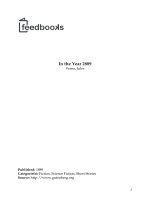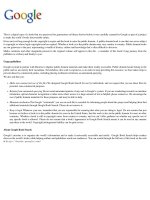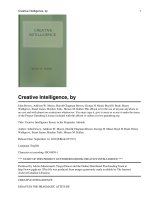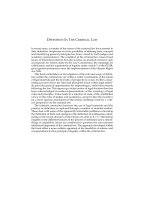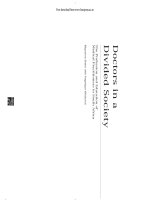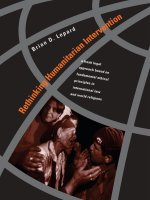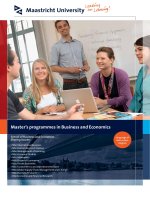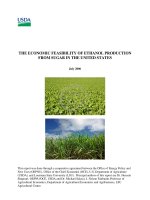Research Ethics in Complex Humanitarian Emergencies docx
Bạn đang xem bản rút gọn của tài liệu. Xem và tải ngay bản đầy đủ của tài liệu tại đây (753.57 KB, 29 trang )
Holly Reed, Rapporteur
Roundtable on the Demography of Forced Migration
Committee on Population
National Research Council
NATIONAL ACADEMY PRESS
Washington, DC
Research Ethics
in Complex
Humanitarian Emergencies
SUMMARY OF A WORKSHOP
NOTICE: The project that is the subject of this report was approved by the Governing
Board of the National Research Council, whose members are drawn from the councils
of the National Academy of Sciences, the National Academy of Engineering, and the
Institute of Medicine. The members of the committee responsible for the report were
chosen for their special competences and with regard for appropriate balance.
This study was supported by a grant to the National Academy of Sciences by the An-
drew W. Mellon Foundation. Any opinions, findings, conclusions, or recommenda-
tions expressed in this publication are those of the author and do not necessarily reflect
the views of the organization that provided support for the project.
International Standard Book Number 0-309-08493-8
Additional copies of this report are available from
National Academy Press
2101 Constitution Avenue, NW
Box 285
Washington, DC 20055
800/624-6242
202/334-3313 (in the Washington Metropolitan Area)
<>
Copyright 2002 by the National Academy of Sciences. All rights reserved.
Printed in the United States of America.
Suggested citation: National Research Council (2002). Research Ethics in Complex Hu-
manitarian Emergencies: Summary of a Workshop. Holly Reed, Rapporteur, Roundtable
on the Demography of Forced Migration, Committee on Population. Washington,
DC: National Academy Press.
The National Academy of Sciences is a private, nonprofit, self-perpetuating society of
distinguished scholars engaged in scientific and engineering research, dedicated to the
furtherance of science and technology and to their use for the general welfare. Upon the
authority of the charter granted to it by the Congress in 1863, the Academy has a
mandate that requires it to advise the federal government on scientific and technical
matters. Dr. Bruce M. Alberts is president of the National Academy of Sciences.
The National Academy of Engineering was established in 1964, under the charter of
the National Academy of Sciences, as a parallel organization of outstanding engineers.
It is autonomous in its administration and in the selection of its members, sharing with
the National Academy of Sciences the responsibility for advising the federal govern-
ment. The National Academy of Engineering also sponsors engineering programs aimed
at meeting national needs, encourages education and research, and recognizes the supe-
rior achievements of engineers. Dr. Wm. A. Wulf is president of the National Academy
of Engineering.
The Institute of Medicine was established in 1970 by the National Academy of Sci-
ences to secure the services of eminent members of appropriate professions in the ex-
amination of policy matters pertaining to the health of the public. The Institute acts
under the responsibility given to the National Academy of Sciences by its congressional
charter to be an adviser to the federal government and, upon its own initiative, to
identify issues of medical care, research, and education. Dr. Harvey V. Fineberg is
president of the Institute of Medicine.
The National Research Council was organized by the National Academy of Sciences
in 1916 to associate the broad community of science and technology with the Academy’s
purposes of furthering knowledge and advising the federal government. Functioning in
accordance with general policies determined by the Academy, the Council has become
the principal operating agency of both the National Academy of Sciences and the Na-
tional Academy of Engineering in providing services to the government, the public, and
the scientific and engineering communities. The Council is administered jointly
by both Academies and the Institute of Medicine. Dr. Bruce M. Alberts and Dr.
Wm. A. Wulf are chairman and vice chairman, respectively, of the National Research
Council.
National Academy of Sciences
National Academy of Engineering
Institute of Medicine
National Research Council
ROUNDTABLE ON THE DEMOGRAPHY OF
FORCED MIGRATION
CHARLES B. KEELY (Chair), Institute for the Study of International
Migration, Georgetown University
LINDA BARTLETT, Division of Reproductive Health, Centers for Disease
Control and Prevention, Atlanta
RICHARD BLACK, Center for Development and Environment, University
of Sussex
STEPHEN CASTLES, Refugee Studies Centre, University of Oxford
WILLIAM GARVELINK, Bureau of Humanitarian Response, U.S. Agency
for International Development, Washington, DC
ANDRE GRIEKSPOOR, Emergency and Humanitarian Action
Department, World Health Organization, Geneva
JOHN HAMMOCK, Feinstein International Famine Center, Tufts
University
BELA HOVY, Program Coordination Section, United Nations High
Commissioner for Refugees, Geneva
JENNIFER LEANING, School of Public Health, Harvard University
DOMINIQUE LEGROS, Epicentre, Médecins Sans Frontières, Paris
NANCY LINDBORG, Mercy Corps, Washington, DC
PAULA REED LYNCH, Bureau of Population, Refugees, and Migration,
U.S. Department of State, Washington, DC
CAROLYN MAKINSON, The Andrew W. Mellon Foundation, New York
SUSAN F. MARTIN, Institute for the Study of International Migration,
Georgetown University
W. COURTLAND ROBINSON, Center for Refugee and Disaster Studies,
Johns Hopkins University
SHARON STANTON RUSSELL, Center for International Studies,
Massachusetts Institute of Technology
WILLIAM SELTZER, Department of Sociology and Anthropology,
Fordham University
PAUL SPIEGEL, International Emergency and Refugee Health Branch,
Centers for Disease Control and Prevention, Atlanta
RONALD WALDMAN, Joseph L. Mailman School of Public Health,
Columbia University
ANTHONY ZWI, Health Policy Unit, London School of Hygiene and
Tropical Medicine
HOLLY REED, Program Officer
v
COMMITTEE ON POPULATION
JANE MENKEN (Chair), Institute of Behavioral Sciences, University of
Colorado, Boulder
ELLEN BRENNAN-GALVIN, Woodrow Wilson Center for
International Scholars, Washington, DC
JANET CURRIE, Department of Economics, University of California,
Los Angeles
JOHN N. HOBCRAFT, Population Investigation Committee, London
School of Economics
F. THOMAS JUSTER, Institute for Social Research, University of
Michigan, Ann Arbor
CHARLES B. KEELY, Institute for the Study of International Migration,
Georgetown University
DAVID I. KERTZER, Department of Anthropology, Brown University
DAVID A. LAM, Population Studies Center, University of Michigan,
Ann Arbor
CYNTHIA LLOYD, The Population Council, New York
W. HENRY MOSLEY, Department of Population and Family Health
Sciences, Johns Hopkins University
ALBERTO PALLONI, Center for Demography and Ecology, University
of Wisconsin, Madison
JAMES W. VAUPEL, Max Planck Institute for Demographic Research,
Rostock, Germany
KENNETH W. WACHTER, Department of Demography, University of
California, Berkeley
LINDA J. WAITE, Population Research Center, University of Chicago
BARNEY COHEN, Director
vi
Preface
vii
The Roundtable on the Demography of Forced Migration was estab-
lished by the Committee on Population of the National Research Council
in 1999. The roundtable is composed of experts from academia, govern-
ment, philanthropy, and international organizations. The roundtable’s pur-
pose is to serve as an interdisciplinary, nonpartisan focal point for taking
stock of what is known about demographic patterns in refugee situations,
to apply this knowledge base to assist both policy makers and relief workers,
and to stimulate new directions for innovation and scientific inquiry in this
growing field of study. Charles B. Keely of Georgetown University serves
as chair of the roundtable, and we thank him for his leadership and guidance
of the group’s activities.
The roundtable meets yearly and has also organized a series of work-
shops (held concurrently with roundtable meetings) on some of the specific
aspects of the demography of refugee and refugee-like situations, including
mortality patterns, demographic assessment techniques, and research ethics
in complex humanitarian emergencies. For more information about the
roundtable and its activities, please contact Holly Reed, program officer for
the Committee on Population (202-334-3167; ).
This report to the Roundtable on the Demography of Forced Migra-
tion is the summary of one such workshop, which was held on October 18,
2001, under the auspices of the Committee on Population. The purpose of
this meeting was to discuss whether it is ethical to do research among dis-
placed populations. Participants explored the moral issues encountered
viii PREFACE
when conducting research among refugee and internally displaced popula-
tions during and in the aftermath of a complex humanitarian emergency.
Although many types of research are becoming more common in these
settings, specific ethical guidelines for such research do not exist. Research
in crisis situations may entail special challenges in terms of ethics, and the
workshop attempted to examine some of these challenges.
This project was funded with a grant from the Andrew W. Mellon
Foundation. We thank Carolyn Makinson, population program officer at
the Mellon Foundation, for her support and enthusiasm for the roundtable’s
work.
Holly Reed authored the report. Christine Chen handled the arrange-
ments for the workshop and Ana-Maria Ignat managed the manuscript
during editing and review. This work was carried out under the general
direction of Barney Cohen. We also thank Christine McShane, of the
reports office of the Division of Behavioral, Social Sciences, and Education,
for editing the report. Any opinions, findings, conclusions or recommen-
dations expressed in this publication are solely those of the individual work-
shop participants and do not necessarily reflect the view of the organization
that provided support for the project nor of the National Research Council
(NRC).
This workshop summary has been reviewed in draft form by individu-
als chosen for their diverse perspectives and technical expertise, in accor-
dance with procedures approved by the Report Review Committee of the
National Research Council. The purpose of this independent review is to
provide candid and critical comments that will assist the institution in mak-
ing its published report as sound as possible and to ensure that the report
meets institutional standards for objectivity, evidence, and responsiveness
to the charge. The review comments and draft manuscript remain confi-
dential to protect the integrity of the process.
We thank the following individuals for their review of this report:
Jonathan D. Moreno, Center for Biomedical Ethics, University of Virginia;
Anne Petersen, W.K. Kellogg Foundation, Battle Creek, Michigan; and
Robert Sprague, Department of Kinesiology, College of Applied Life Stud-
ies, University of Illinois (emeritus).
Although the reviewers listed above have provided many constructive
comments and suggestions, they were not asked to endorse the content of
the report nor did they see the final draft of the report before its release.
The review of this report was overseen by David I. Kertzer, Department of
Anthropology, Brown University. Appointed by the National Research
PREFACE ix
Council, he was responsible for making certain that an independent exami-
nation of this report was carried out in accordance with institutional proce-
dures and that all review comments were carefully considered. Responsi-
bility for the final content of this report rests entirely with the author and
the institution.
Jane Menken, Chair
Committee on Population
Contents
xi
Ethical Approaches 1
The Example of Liberia 3
Ethical Norms 4
Social and Demographic Categories 6
Informed Consent 8
Risks and Benefits 10
Summary and Final Discussion 11
Key Suggestions by Participants 11
Appendix: Workshop Agenda and Participants 13
1
Research Ethics in
Complex Humanitarian Emergencies
Situations involving conflict and forced migration have become in-
creasingly commonplace in today’s world. The need to understand the
causes, consequences, and characteristics of these situations is creating a
burgeoning field of research. But given the nature of complex emergency
settings, traditional research guidelines may be inappropriate. The research
and policy community has recognized this problem and has begun to ad-
dress issues surrounding the ethics of doing research in emergency settings
and among conflict-affected and displaced populations. The Roundtable
on the Demography of Forced Migration, under the aegis of the Commit-
tee on Population of the National Research Council, held a workshop to
examine some of these issues. This report to the roundtable summarizes
the workshop presentations and discussion but does not make any attempt
to provide guidelines, conclusions, or recommendations for researchers or
policy makers.
ETHICAL APPROACHES
The concept of research ethics is seeping slowly into the world of refu-
gee research. For example, many countries are now requiring research
projects among displaced persons to undergo ethical review (e.g., in Uganda
and Tanzania). Some of the key questions facing researchers include: What
is the ethical imperative of doing research at all? What amount and type of
2 RESEARCH ETHICS IN COMPLEX HUMANITARIAN EMERGENCIES
research are permissible? And what are the ethics of doing research on inter-
ventions that are not sustainable after repatriation occurs?
Judith Lichtenberg of the University of Maryland, College Park, began
the discussion of the ethical dilemmas that researchers face. One major
ethical quandary has to do with the risks and benefits of research. Should
an action be judged only by its ultimate effects, or should it be judged by its
means and its end? In emergency settings, as in other settings, research
may often benefit future populations of refugees but be of little immediate
value to the research subjects themselves. Is it ethical to do research when
the participants are not the immediate beneficiaries? Philosophically, this
is a key issue in the current debate. Some researchers advocate that it is
enough for a researcher to simply “do no harm,” while others argue that
research must benefit participants or others. But if this is the case, who
must the research benefit—individual research participants, the group of
refugees at the research site, refugees everywhere? There are many other
ethical concerns, including the process of informed consent, the
sustainability of research, the security of data used for research, and the
question of who owns and profits from the use of data and research.
Workshop participants benefited from a brief presentation by Jonathan
Shay of Tufts University Medical School and the Department of Veterans
Affairs Outpatient Clinic in Boston, Massachusetts. He addressed two
issues; first, in conflict-affected settings, the researcher and the sponsoring
organization have a duty to make a safety assessment: Are the research sub-
jects still vulnerable to coercion or retribution? In many such settings, the
confidentiality and security of the original research records cannot be en-
sured, despite the researcher’s good intentions. Second, psychosocial inter-
ventions are becoming more widespread in refugee camps, raising aware-
ness of the mental health of refugees. However, the mental health of
humanitarian field workers and researchers can be damaged by intense ex-
posure to both the physical and psychological consequences of complex
humanitarian emergencies. “Secondary” or “vicarious” trauma can damage
the research and the researcher. Age, experience, or professional training
may not provide adequate protection from secondary trauma. Shay dis-
cussed the dangerous phenomenon of “baseline creep,” which can occur
when researchers become gradually habituated to and thus fail to protect
themselves emotionally from the horrors and risks of working in dangerous
settings with research subjects who have experienced atrocities. Both re-
searchers and research subjects can become inured to violence, tending to
minimize both its continued probability and its impact. Neither good
SUMMARY OF A WORKSHOP 3
intentions nor an overconfident attitude can protect researchers. Without
adequate self-care, working in these situations can cause psychological in-
jury to everyone from medical doctors, to social workers, and even to data
analysts located at a distance geographically. In Shay’s opinion, there is an
ethical “duty to warn” both humanitarian field workers and researchers of
humanitarian emergencies about secondary trauma and a duty to provide
protective resources, such as training in self-care and practices that reduce
the frequency and severity of injury from this occupational hazard.
Another important question that participants discussed has to do with
what types of activities constitute research. There are many reasons to
collect data in an emergency setting (administrative data collection, physi-
cian interviews, surveillance, to name a few), but not all of these are consid-
ered research. However, they may still involve potential risks and benefits
for research subjects, depending on the future use of such data.
The dangerous and extreme circumstances that accompany conflict
and forced migration can make it very difficult to conduct ethical research.
For example, W. Courtland Robinson of Johns Hopkins University recalled
a situation in which ethnic Karen public health workers crossed the Thai
border in Burma accompanied by armed insurgents as security guards in
order to conduct public health surveys. Can one ethically make use of the
data they collected? Many nongovernmental organizations (NGOs) collect
program data that are meant to be internal, but are later used by research-
ers; is it ethical to use these found data? If they are individual case notes, is
the answer different than if they are macro-level data? Also, it may not be
known whether or not the data were collected in an ethical manner. All of
these issues are real dilemmas in the field when data are precious but may
be fraught with ethical concerns.
THE EXAMPLE OF LIBERIA
The general ethical principles may be the same in every emergency, but
there are specific ethical challenges that researchers encounter in each set-
ting. Participants heard a case study on the ethics of research and humani-
tarian practice in Liberia presented by Richard Black of the University of
Sussex. This example focused on the development of ethical codes for
humanitarian action and sought to draw lessons applicable to ethical codes
for research in similar situations.
As Black explained, in Liberia, two humanitarian codes of conduct
were developed during the emergency: the Principles and Protocols for
4 RESEARCH ETHICS IN COMPLEX HUMANITARIAN EMERGENCIES
Humanitarian Operations (PPHO), which was a United Nations (UN)
initiative, and the Joint Plan of Operations (JPO), which was initiated by
the NGOs. The PPHO was focused on such issues as impartiality, neutral-
ity, independence, informed consent, and the targeting of aid, because of a
concern that aid was sustaining or legitimizing armed factions. The JPO
was instituted after the April 1996 looting of aid and ransacking of NGO
offices by armed factions; its focus was on minimum targeted lifesaving
activities (MTLA).
The ethical codes tended to place limits on research and operations in
Liberia, but Black argued that the very process of establishing codes was
useful because it created a dialogue between donors and agencies about
ethics. Yet even in this case there was poor coordination among agencies
(six separate studies were commissioned to review the Liberian experience),
so clearly even more discussion and harmonization are needed in the fu-
ture. Redundancy and overlap are a common problem in emergency set-
tings; there is a continuing accumulation of similar studies without any
coordination among the research teams. Then if their findings are contra-
dictory, it is unclear what the policy implications may be. Is it ethical to
reapproach the same population to collect similar data if prior data remains
unused?
ETHICAL NORMS
Perhaps one place to start to understand research ethics is to examine
the ethics codes for biomedical research, including the Declaration of
Helsinki of the World Medical Association (Helsinki), the reports of the
National Bioethics Advisory Commission (NBAC), and the proceedings of
the Council for International Organizations of Medical Sciences (CIOMS).
Kate MacQueen of Family Health International reviewed some basic tenets
of these guidelines. All of these documents support the principles of respect
for human beings and informed consent, beneficence (i.e., do no harm),
and justice and the “fair” distribution of risks and benefits. Currently a lot
of debate surrounds biomedical research ethics in the context of global and
local inequities in access to medical care and preventive services. Access
appears to be inversely related to need, and there are concerns that profit
(rather than health goals) is driving biomedical research—particularly clini-
cal trials—in developing countries and among vulnerable populations.
MacQueen noted that the type of research that was the focus of the
workshop actually falls outside this realm; in most refugee settings, research
SUMMARY OF A WORKSHOP 5
involves nonexperimental studies. Public health surveillance and outbreak
investigations during the emergency phase are generally not considered to
be research per se, but program evaluations, surveys, and observational re-
search that occur in these settings are. For the public health researcher who
is also a medical doctor, there may be many questions about ethical obliga-
tions. For example, is there an obligation to treat an ill research subject
even if there is no access to care for the general population or there are great
inequities in access to care? Or is a researcher obligated to disclose a health
condition to a participant if the participant does not want to know or if no
treatment is available locally (e.g., HIV/AIDS)?
Addressing these situations requires careful thought about conse-
quences. The biomedical community has a common basis for ethical de-
bate in its ethics codes. Participants were reminded by a presentation by
William Seltzer of Fordham University on social science ethics codes, how-
ever, that the social sciences include a wide variety of disciplines (demogra-
phy, economics, sociology, political science, etc.). Social scientists, unlike
physicians, for example, are generally not licensed or legally regulated by a
government. Ethical sanctions in the field of the social sciences are gener-
ally left to professional institutional review boards (IRBs), funding agen-
cies, or professional societies. Although threats and risks can be thought of
as either invasive or passive (merely gathering information), social science
research may be more invasive than researchers think, especially in emer-
gency settings.
Institutional review boards need to develop a different process for
thinking about research ethics in refugee settings. Felice Levine of the
American Sociological Association described various types of humanitarian
emergencies—including natural disasters and state-sponsored, political op-
pression—and the range of harms, benefits, and risks associated with them.
In each of these settings, the physical, political, and legal consequences for
research participants may be more dangerous than in most research; the full
range and types of risks may not be known; and the benefits may involve
lowering the probability of harm for persons who have already been sub-
jected to harm and are at great risk of further harm. Given these unique
circumstances, IRBs and investigators should consider decision strategies
for addressing ethical issues that are different from those used in “normal”
settings. This is necessary because the legal recourse usually afforded re-
search participants in other settings may be virtually nonexistent, despite
the fact that many researchers are still bound by the ethical codes and laws
of their home countries and institutions. Current ethical codes and guide-
6 RESEARCH ETHICS IN COMPLEX HUMANITARIAN EMERGENCIES
lines, however, do not readily translate to research in challenging situations
that are rapidly changing.
The circumstances of humanitarian emergencies essentially require a
more flexible, dynamic process than is typical, Levine emphasized. New
approaches could help to advance essential research done ethically and re-
sponsibly. Perhaps, in refugee settings, adjunctive mechanisms could be
devised to address unanticipated ethical decisions or dilemmas as they
present themselves. For example, peer advisory panels could be comprised
of experts with social, cultural, political, or historical perspectives as well as
local representatives or others with community knowledge, including local
researchers. Such groups could provide advice and feedback to investiga-
tors regarding unanticipated ethical concerns as they arise in the field. The
IRB role would be to evaluate protocols to ensure that investigators antici-
pate different types of events and unforeseen circumstances and have suffi-
cient plans in place for protecting participants. IRBs would do their review
aware that on-site panels can be drawn on in refugee settings to provide
timely ethical guidance.
Also, as Ronald Waldman at Columbia University pointed out, group
benefits and risks need to be carefully thought out before implementation
of group or social consent as an alternative to individual consent. In all of
these situations, the social context is rapidly changing, so researchers need
to outline the types of emergencies and their potential ethical challenges
beforehand. They need to indicate the range of types of research that are
possible and the unique risks and benefits of research in each setting. NGOs
and others need help and guidance on these issues.
SOCIAL AND DEMOGRAPHIC CATEGORIES
One key component of social science research has to do with social and
demographic categorization. Workshop participants listened to a presenta-
tion by Ruth Krulfeld of George Washington University about social cat-
egories and anthropological work among refugees. Social categories are
often culturally determined, so finding the right recipients for aid depends
on who determines vulnerability. The local population can be quite helpful
in this process if they are not dismissed by researchers as “powerless” or
victimized.
It is also important to recognize that definitions of harm vary from
culture to culture, Krulfeld argued. For example, some Western researchers
in Afghanistan thought of women being forced to wear a full veil as a
SUMMARY OF A WORKSHOP 7
human rights abuse, but many Afghan women themselves did not. There
can be great tension between cultural relativism and the universality of
norms assumed by international human rights law. Ethics can help re-
searchers to navigate this tension. Human rights codes are also a guide that
can be used. The judgment of some researchers is that research can become
more ethical by including the research subjects in the research process
through the use of anthropological methods such as participant observa-
tion and focus groups. When researchers talked with the Afghan women
about which of their rights they felt were being abused, they found them to
be much more concerned about the lack of schooling for girls than the
enforcement of veil wearing.
According to Krulfeld, including refugees as partners can often help to
present or resolve ethical dilemmas. Understanding the community’s cul-
tural context also helps researchers to think about their role as benefactors
in and risks to the community. Are local field staff treated equitably? Are
they in danger because of their employment? What happens to the re-
search when the expatriate researchers leave? Understanding the societal
structure and relationships among groups can help researchers to avoid
placing themselves or their local field staff in danger.
Children, due to their age and lack of societal influence, may be in a
particularly vulnerable position in emergency settings. Kirk Felsman of
Duke University discussed experiences conducting research with refugee
children. With children, the first ethical question concerns the age at which
one is no longer considered a child. This definition varies greatly among
international conventions, researchers, aid agencies, communities, and chil-
dren themselves. But it is important because it affects how and among
whom research is conducted. Nevertheless, child refugees—just like other
refugees—need to be able to tell their story for a variety of reasons. How-
ever, many potential risks are involved in this process when working with
children. Children are of utmost concern to a variety of groups and there-
fore are subject to numerous possible abuses and exploitation. They may
be put through multiple interviews, possibly with untrained or inexpert
interviewers. The interviews may not be private or confidential if parents
or other relatives are involved. But researchers and ethical guidelines may
differ about whether or not children can give their own informed consent,
and their cognitive capacity to consent may also depend on a range of
factors, including intellect, emotional maturity, and the degree of parental
involvement or interference.
In addition, Felsman emphasized that many ethical implications sur-
8 RESEARCH ETHICS IN COMPLEX HUMANITARIAN EMERGENCIES
round the issues of large databases and other materials (i.e., poems, draw-
ings) collected from child refugees. For example, hard copy data collected
from children in Sudan was moved a total of eight times between 1987 and
1996 and handled by multiple agencies. This created matching problems,
lost data, and damaged data; this is not an uncommon occurrence. Be-
cause researchers have an ethical obligation to protect and secure their data
archives, should research be conducted if security is an impossibility? Al-
though family tracing databases for lost children (like the ones set up by the
Red Cross) are meant for program purposes, they have research potential.
But the ownership of the data is sometimes unclear; does it belong to the
refugees or to the agency? Also, the identification of certain children as
vulnerable can be harmful as well as helpful; it may cause tensions in a
community.
Although it is important to recognize different cultural norms, Susan
Martin of Georgetown University argued that cultural relativism can actu-
ally prevent agencies from defining people as refugees in order to protect
and aid them. For example, if female genital mutilation is accepted as a
cultural difference rather than a human rights abuse, then women who
experience it may not be able to apply for protection under refugee status
or asylum laws.
All of these problems are complex, but simple frameworks can help
researchers to find solutions. Paula Reed Lynch of the U.S. Department of
State listed four mantras for working in complex humanitarian emergen-
cies. First, use local resources. Second, use global resources. Third, learn
from previous research and program experiences. And fourth, you cannot
easily change directions when a program has already begun. For example,
if a feeding program has begun by giving food to men but discovers that it
is better to give the food to women, it may be difficult to change the estab-
lished routine. Therefore, research must be built into a program from the
beginning, and programs must build on knowledge gained from research in
previous emergencies.
INFORMED CONSENT
To set the stage for a discussion of informed consent, Phillip Nieburg
of the Centers for Disease Control and Prevention considered the different
stages of an emergency as a sort of continuum of development. What one
SUMMARY OF A WORKSHOP 9
really should be asking is: What kind of consent is necessary and feasible
for different types of emergencies, at different stages and for different types
of data collection or research? Informed consent needs to be seen as an
ongoing process, not just a one-time event.
Nieburg noted that explicit consent is not necessary in surveillance or
outbreak investigations. However, what about once a refugee camp is more
established? Are refugee camps like institutions, since individuals lack au-
tonomy? If so, then informed consent cannot create autonomy. But it is
possible that there could be a waiver of consent granted by an IRB in a
minimal risk situation. Or perhaps group consent or another form of sur-
rogate consent could be implemented. However, this avenue may not rec-
ognize individual rights.
Individuals may want to opt out of research, but Nieburg argued that
they might be just as likely to want to participate in it even if the commu-
nity does not because there are benefits as well as risks to research. Yet the
concept of individual consent may be misunderstood, particularly in cha-
otic settings. If “social trust” is destroyed, then what kind of informed
consent are refugees truly capable of giving? Either because of cynicism or
dependence, true informed consent may be impossible to obtain.
Many participants argued against the idea of consent waivers or the
possibility of “triaging” research, stating that it could easily slip into human
rights abuses by unethical practitioners. As Ron Bayer of Columbia Uni-
versity argued, protection has to take precedence over strict consent proce-
dures in some cases. In a study of illegal North Korean migrants in China,
only oral consent was obtained because of concern for the migrants’ secu-
rity.
Despite the fact that informed consent may be more difficult to obtain
in refugee camps, Richard Black of the University of Sussex advocated that
it should not be abandoned even for research other than public health re-
search. Social science research, such as studies of food distribution or live-
lihood strategies, can still be important in the postemergency phase and in
fact helps communities to recover, because it is a normalizing activity. Ulti-
mately, participants conceded that the informed consent model might be
waived during the acute emergency phase for public data collection activi-
ties (surveillance, outbreak investigations), but only for a short period of
time. Note that public health surveillance and outbreak investigations in
the United States do not require informed consent procedures.
10 RESEARCH ETHICS IN COMPLEX HUMANITARIAN EMERGENCIES
RISKS AND BENEFITS
In an extreme emergency situation, is there any type of research that is
ethical? For example, one might contemplate testing new therapeutic feed-
ing programs on severely malnourished children. In other words, that
would be the equivalent of a clinical trial, but without informed consent.
Does the possibility of reducing mortality among those children or among
children in future emergencies justify research without informed consent?
Participants differed on this point. Ronald Waldman of Columbia
University argued that most important in this setting is to perform triage.
Triage allows some people to come to harm in an emergency because they
require too many resources from a pool that is limited. The harm is already
done and there are no good outcomes, but the focus must be on saving
those who can be saved. Without testing the outcomes of a potential new
therapy in an actual emergency situation, it is impossible to improve prac-
tices in order to limit the damage in future situations. Research is necessary.
Of course, it must be carefully thought out and as much as possible should
be done following the emergency phase, but research should be promoted
to improve public health and perhaps other lifesaving practices (e.g., pro-
tection).
On the other side of the debate, Jennifer Leaning of Harvard Univer-
sity initially thought that no research could pass ethical muster for the
emergency phase, but she now considers that it is possible that there are a
few situations (such as the example of testing new therapies for malnour-
ished children) that can be done in the acute emergency phase. Yet in
practice it is very dangerous. There are a variety of issues surrounding
informed consent and human rights that make it risky. For example, refu-
gees are especially vulnerable because they are not completely protected by
host country law and local culture and are essentially powerless and depen-
dent on others for protection and care. Ethical codes may not be sufficient
to protect populations in these straits. In addition, refugees must be treated
with the utmost regard for their autonomy and human rights, so informed
consent is essential. But it is likely to be impossible in many settings. A
protective voice is needed which includes members of the affected commu-
nity if possible, or at least individuals who are familiar with the culture and
population—such as the advisory review panel suggested by Felice Levine
(see below). Some researchers argue that research should be limited in all
phases of emergencies. If research is deemed to be essential, then the refu-
gees’ capacity to give informed consent must first be taken into account.
SUMMARY OF A WORKSHOP 11
This discussion highlighted why understanding the stages and phases
of emergencies is crucial. However, the phases are not always clear, stable,
or progressive. Most importantly, the capacity of the population to give
informed consent for and participate in research must be carefully analyzed
before any research is done.
SUMMARY AND FINAL DISCUSSION
The dialogue at the workshop barely grazed the myriad ethical issues
surrounding research among displaced and conflict-affected populations.
Participants agreed that a great deal of discussion is needed. There are
several ongoing projects on research ethics in emergencies at the World
Health Organization, the Harvard School of Public Health, and the Ameri-
can Public Health Association, among others. Given that ethics questions
differ depending on the type of emergency, the development of a compre-
hensive taxonomy of types of complex humanitarian emergencies would be
useful. Researchers, policy makers, NGOs, and international agencies must
be careful to think about the ethical implications of their actions and con-
tinue to discuss and debate these questions both within and outside the
field.
KEY SUGGESTIONS BY PARTICIPANTS
• Warn both humanitarian field workers and researchers in humani-
tarian emergencies about secondary trauma and provide protective re-
sources, such as training in self-care and practices that reduce secondary
trauma and its effects (Shay).
• The very process of establishing ethical codes can be useful because
it creates a dialogue between donors and agencies about ethics (Black).
• Institutional review boards need help with thinking about research
ethics in refugee settings; peer advisory panels could be comprised of ex-
perts with social, cultural, political, or historical perspectives as well as local
representatives or others with community knowledge, including local re-
searchers. These panels could provide advice and feedback to investigators
regarding unanticipated ethical dilemmas in the field (Levine).
• Researchers should outline types of emergencies and their potential
ethical challenges before beginning research, indicating the range of types
of research that are possible and the unique risks and benefits of research in
each setting (Waldman).
12 RESEARCH ETHICS IN COMPLEX HUMANITARIAN EMERGENCIES
• The use of anthropological methods, such as participant observa-
tion and focus groups that include the research participants in the research
process can help research become more ethical and prevent researchers and
local field staff from placing themselves in dangerous situations (Krulfeld).
• Build research into a program from the beginning and build on
knowledge gained from research in previous emergencies when designing
programs (Lynch).
• Informed consent should be an ongoing and reflexive process, not
just a one-time event (Nieburg).
• Protection of refugees must take precedence over strict consent pro-
cedures in some cases (Bayer).
•“Triaging” research in emergencies under some circumstances is
needed; by testing the outcomes of a potential new therapy or procedure in
an actual emergency situation, it may be possible to improve public health
or protection practices in order to limit damage in future situations
(Waldman).

